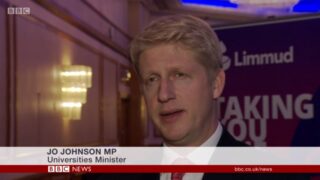One of the Daily Mail’s pet moral panics was turned into concrete education policy after the government stated its new position on campus debate: universities who practice “no-platforming” (disinviting controversial or inappropriate speakers from events) will face fines for doing so, starting in April. The directive was announced on Boxing Day by universities minister Jo Johnson.
Meanwhile BBC News, without a lick of irony, chose to cover this by airing the government’s position – and nobody else’s.
One of the state broadcaster’s flagship news programs BBC News at Six told viewers: “academic institutions have been warned by the government that they must protect freedom of speech or face possible fines.” Explaining Johnson’s position in their own words, the BBC’s institutional clout was deployed to instruct the public that these fines would “ensure students could both hear and challenge controversial ideas.”
Challenging the government, however, appears to be an irrelevance that does not even bear mentioning to the BBC’s millions of viewers – who each pay £147 a year for the License Fee which funds the public broadcaster.
Segments of Johnson’s position were filmed without journalists questioning him, and without offering (or even mentioning) a comment from an opposing position. “Debate is how bad ideas and prejudices get exposed,” Johnson said with a straight face.
The BBC’s coverage chose, for instance, not to tell their famously loyal License Fee payers about a 2016 poll in which two thirds of National Union of Students members expressed support for the NUS’s no-platform policy.
Equally bizarre was their decision to broadcast Johnson’s patronising insistence “that we have freedom of speech within the law operating in our university system” without even a cursory assessment of whether or not such lawful adherence to the principles of open debate already exists in Britain’s university system (it does). Universities could quite easily have debated Johnson’s moronic superfluity; where was their platform?
“We don’t need people to be cosseted”, he declared from his convenient safe space.
The issue in question is not vague: Johnson and the BBC were perfectly clear that the government is prioritising speakers who whitewash the British Empire, who excuse Israel’s illegal West Bank settlements, and who target the rights of transgender people. Luckily for Boris’s tragically uncharismatic little brother, the BBC’s news editors didn’t deign such pesky annotation necessary for a man who surely can’t be lying about his innocent desire for universities to “open minds, not close them”.
Whatever the purpose of this oversight, a keen-eyed newcomer to the topic of campus free speech might be forgiven for seeing the BBC’s oversight of Johnson’s purpose as an unwillingness to honestly examine what is tantamount to endorsing hate crimes.
It is important not to assume on a hunch that Johnson intends to cause the further proliferation of hate crimes in a society that increasingly oxygenates their foundational rhetoric. We should still opt here to have good faith, and can (for now) put to one side the fact that hateful agendas are often advanced by habitual liars whose deliberate debasement of honest inquiry absolutely does not deserve the institutional validation a university debate provides.
But regardless of whether Johnson is sincere in his desire to protect robust debate, he is necessarily being stupid. His reckless ignorance is going to get someone hurt. Intent doesn’t matter as much as he thinks, and even if he isn’t being purposely counterfactual in order to smear his opponents (which he might), it remains fundamentally dangerous for him to have asserted that “in universities in America and worryingly in the UK, we have seen examples of groups seeking to stifle those who do not agree with them.”
To be clear, the principle behind policies like campus safe spaces and no-platforming is absolutely not to ‘coddle’ students who are too ‘fragile’ and simply want to avoid ‘people who disagree’. The students and faculties who support these policies aren’t dismissing the sanctity of facts: rather they are treating facts with the sense of duty and care that truth requires. It is either malicious or oblivious of the Right to keep pushing the silly notion that intellectual discovery is being crushed by something as simple as hurt feelings in the name of something as foolishly short-sighted as emotional comfort.
Inviting someone to speak at a university is not an endorsement of their views per se, but by the nature of their institutional status as sites of knowledge production that can generally be relied upon by wider society, a university invitation provides a speaker with the kind of legitimacy that has genuine currency in the real world.
Germaine Greer is not disinvited from campus debates because people are afraid of ‘losing’ a debate to a superior intellect. She is disinvited because of the laughably shoddy quality of her ‘intellectual’ modus operandi, and because her hatefully unhinged views are essentially worthless to any serious field of academic inquiry.
Richard Spencer is not disinvited from campus speaking engagements because his advocacy for white supremacy is based on some exciting new ideas about ethnic cleansing that would in any way benefit college students. He is kicked out of campuses because he is a spiteful, dishonest loser who can’t find a better way to squander his trust fund than to stir up the boring insecurities of knuckle-dragging racists until they literally kill people in the streets for opposing genocide.
The case of Spencer, in particular, highlights something deeply unsettling about whose speech Jo Johnson is concerned with prioritising and whose agenda he would force universities to validate. These decisions have consequences.
Britain’s reaction to the murder of the Labour MP Jo Cox by an armed neo Nazi wasn’t simply an outpouring of disgust for open hate speech. In many quarters it was also a moment of urgent reflection on the nature of coded hate speech, on dog whistles and the perfectly avoidable horrors that can be unleashed when powerful people don’t treat the organic nervous system of a nation’s public discourse with a sufficient sense of responsibility.
It is wrong to blame right wing newspapers for Cox’s murder, but it is equally wrong to ignore those newspapers’ blasé mismanagement of the political energy distilled and contained in those Brexiters’ breathless “will of the people” mantra. The eternally malevolent Daily Mail, for instance, could hardly go one day without hinting not-so-subtly that by holding firmly liberal views Cox was essentially asking for it. So of course they continue to joyride their putrid fascist instincts into smearing any forms of parliamentary sovereignty that refute their nationalism, with unabashed front page hysteria about “traitors” and other such incitement.
It is highly unlikely that Jo Johnson agrees with the Mail on this, but takes such as his bizarrely snobbish opinion that people voted for Brexit because they are uneducated falls a very long way short of rejecting the Mail’s power. Yes, the Mail’s frothing subscribers generally deserve their reputation for wilful gullibility; but blaming them in a way that fails to blame the scheming dope pushers who actually print that sludge betrays just how little Johnson knows or cares about the responsibility of Britain’s reactionary ruling class.
We could have called his attitude unfortunate. But it became genuinely toxic when he chose to make excuses for Tory whip Chris Heaton-Harris who, riffing on the Mail’s bloodthirst, sent a “McCarthyite” letter to universities demanding they supply him with the names of lecturers teaching courses that relate to Brexit.
Johnson’s insistence that Heaton-Harris’s threatening behaviour was merely an “academic inquiry” reveals with chilling clarity that he is dangerously unsuited to the task of comprehending something so precious and so important as free speech in academia. Imagine: a universities minister who is totally, horrifyingly incapable of appreciating the purpose and value of universities.
The BBC is one of Britain’s most potent arbiters of what passes for truth. And they deemed it appropriate to give all that power to a malicious buffoon, who wants to erode the fabric of society for the sake of whatever bullshit fantasies motivate his sense of entitlement.
BBC News at Six pulls an average of 4 million viewers per night, and the broadcaster purports to serve its paying public with editorial independence from Downing Street thanks to funding from the £147-per year License Fee. The BBC’s editorial guidelines state that “we must be independent from outside interests and arrangements which could undermine our editorial integrity.”
However, this principle is seen by many to be dangerously undermined by the fact that appointees to governing body the BBC Board are ultimately decided by the Prime Minister, via the Department for Culture, Media and Sport. There have even been claims from their own top MPs that the Tory leadership is not afraid of directly meddling in BBC political programming.
In 2017 the BBC Board replaced the already questionable BBC Trust, with opposition MPs expressing alarm at the new charter’s suspiciously government-friendly foundations, including its obvious potential as a vehicle for deep budget cuts.
Even more worrying is the new board’s obscene failure to resolve the vast conflicts of interest the BBC Trust had with the financial sector. Theresa May’s ideal candidate for BBC Board leadership was initially former Trust chair Rona Fairhead, who never convincingly refuted the charge that her making more than £500,000 a year from HSBC during her tenure was related to the BBC’s extremely generous treatment of the bank’s many corruption scandals – including Swiss tax avoidance.
The government failed to install Fairhead (who was instead given a life peerage and an international trade ministership), but still managed to parachute in the suitably blue-blooded David Clementi, a veteran of the revolving door between big banks and Tory governments since his work as a highly effective privatisation guru in the Thatcher government. Rona Fairhead gave Clementi’s appointment her enthusiastic endorsement.
To be fair, it might be a little unreasonable to declare beyond a reasonable doubt that the BBC chose to intentionally propagandise for Downing Street’s dishonest anti-intellectualism. We ought to charitably entertain the small possibility that their news editors are just extremely incompetent dullards who lack a basic understanding of the core principles of journalism.
In either case they have form, and it is hardly surprising given the BBC’s patchy historical record that a Tory government ends up enjoying such dubious institutional protection. This is, after all, the very same state broadcaster whose most senior leadership covered up Jimmy Savile’s lifelong child abuse spree, for fear of embarrassing a modern day establishment still cashing in on the legacy of Margaret Thatcher, who was told about it, but still considered Savile’s heroic myth to be an asset in elections.



